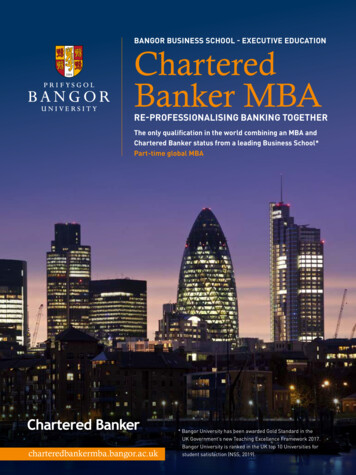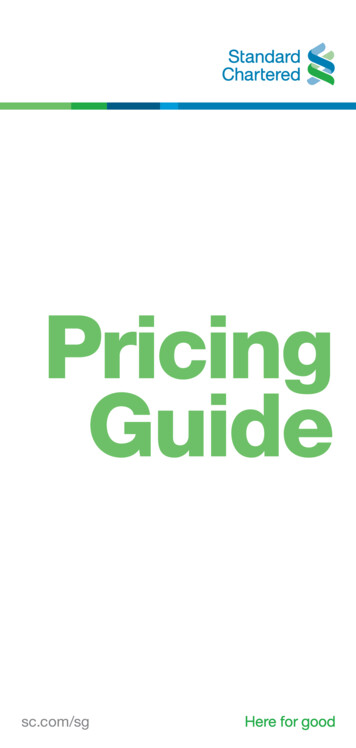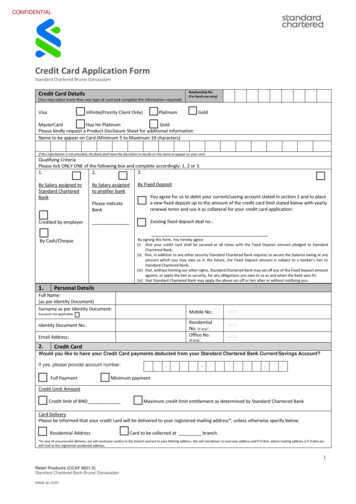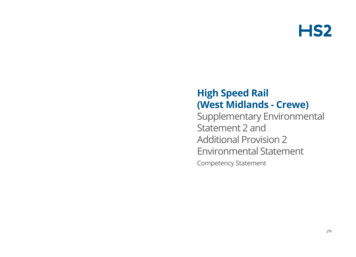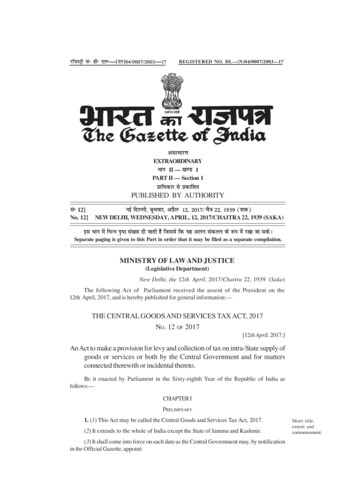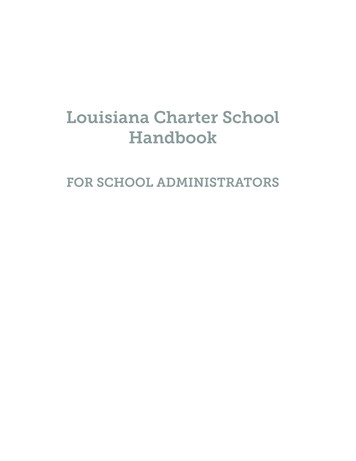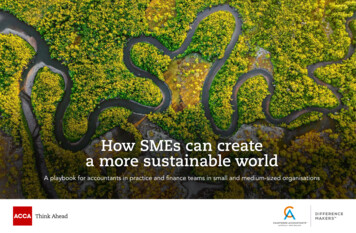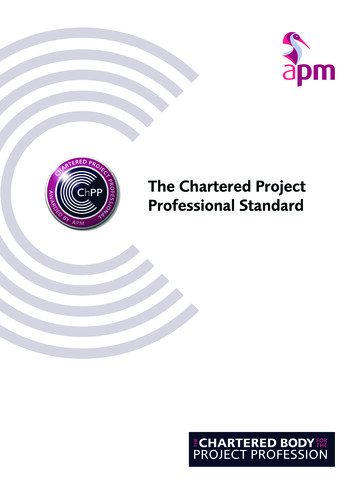
Transcription
The Chartered ProjectProfessional Standard
Contents2Page 31. IntroductionPage 42. Achieving the chartered standardPage 42.1. EligibilityPage 52.2. RequirementsPage 62.3. CompetencesPage 92.4. Technical knowledgePage 92.5. Professional practicePage 92.6. Professional ethicsPage 92.7. Continuing professional developmentPage 103. Access routes to achieving the chartered standardPage 103.1. Route 1Page 113.2. Route 2Page 113.3. Route 3Page 124. Criteria for recognised assessmentsPage 125. Further informationPage 13Appendix 1: Access routes to achieving the chartered standard
1. IntroductionThe Association for Project Management (APM) is an independent educational charityand learned society incorporated by Royal Charter. APM uses its chartered status to raisestandards and enhance the status and recognition of project, programme and portfoliomanagement.The Chartered Project Professional Standard is a professional benchmark thatdemonstrates attainment of a defined level of technical knowledge, professional practiceand ethical behaviour. It forms the basis of the assessment that applicants must pass to gainChartered Project Professional (ChPP) status and inclusion on the Register of CharteredProject Professionals.The standard has been designed to be rigorous and equally accessible to individuals withqualifications or with significant relevant experience of projects, programmes or portfolios.It is drawn from the APM Competence Framework and responses to the consultation. Itrecognises the diverse paths individuals take into the profession, offering three routes toChPP.3
2 Achieving the chartered standard2.1. Eligibility“An individual’s activestatus will be assessedon application for ChPPstatus and by means ofa continuing declarationon renewal”The chartered standard is open to individuals who are deemed to be professionally activeand able to meet the assessment requirements.An individual’s active status will be assessed on application for ChPP status and by meansof a continuing declaration on renewal.The definition of ‘professionally active’ is:a) having a proven track record delivering projects, programmes, portfolios or a keycontrol or enabling function; andb) having up-to-date knowledge of current practices and methods; andc) being actively involved in the project management profession.Where the evidence provided in an individual’s application is more than five years old,a currency statement will be required to explain how they have continued to meet theprofessionally active criteria above.4
2.2. RequirementsBy attaining the chartered standard and ChPP status, as a project professional you will beable to demonstrate:Advanced technical knowledge and understanding of how to deliver projects,programmes or portfolios taking into account many interacting factors and differentapproaches that could be taken;Successful application of this knowledge to deliver projects, programmes or portfoliosthat involved:uncertainty or conflicting objectives;high levels of unpredictability or risk;multiple work packages, projects or programmes; andmultiple interdependent stakeholders, possibly with competing interests;Commitment to professional ethics; andCurrency of practice and commitment to continuing professional development (CPD).To achieve the chartered standard and entry onto the Register of Chartered ProjectProfessionals, you will be required to:“Having successfullydemonstrated therequired evidence,you will undergo anassessment interview”pass an assessment of technical knowledge in the designated competences;pass an assessment of professional practice in the designated competences;provide details of two proposers in support of your application;confirm CPD and reflective learning has been undertaken in the past 12 months,and commit to continuing to comply with APM’s CPD requirements; andcommit to the APM Code of Professional Conduct and provide evidence of anunderstanding of an ethical way of working as part of an interview process.Having successfully demonstrated the required evidence, you will undergo anassessment interview.5
2.3. Competences“All applicants need todemonstrate their technicalknowledge and professionalpractice across a rangeof specified competencesdrawn from the APMCompetence Framework”All applicants need to demonstrate their technical knowledge and professional practiceacross a range of specified competences drawn from the APM Competence Framework.These are split between mandatory and elective:Mandatory competencesEvidence needed for all 10Elective competencesEvidence needed for twoTeam managementProcurementThe ability to select, developand manage teams.The ability to secure provision ofresources needed for change initiative(s)from internal and/or external providers.Conflict managementContract managementThe ability to identify, address andresolve differences between individualsand/or interest groups.The ability to agree contracts for theprovision of goods and/or services,to monitor compliance and tomanage variances.LeadershipRequirements managementThe ability to empower and inspireothers to deliver successfulchange initiatives.The ability to prepare and maintaindefinitions of the requirements ofchange initiatives.Risk, opportunity andissue managementSolutions developmentThe ability to identify and monitor risks(threats and opportunities), to plan andimplement responses to those risks, andto respond to other issues that affect thechange initiative.6The ability to determine the best meansof satisfying requirements withinthe context of the change initiative’sobjectives and constraints.Consolidated planningSchedule managementThe ability to consolidate and documentthe fundamental components of achange initiative: scope; schedule;resource requirements; budgets;risks; opportunities and issues; andquality requirements.The ability to prepare and maintainschedules for activities and eventsfor change initiatives, takingaccount of dependencies andresource requirements.Governance arrangementsResource managementThe ability to establish and maintaingovernance structures that defineclear roles, responsibilities andaccountabilities for governance anddelivery of change initiatives, and thatalign with organisational practice.The ability to develop, implementand update resource allocationplans (other than finance) forchange initiatives, taking accountof availabilities and scheduling.
Mandatory competencesEvidence needed for all 10Elective competencesEvidence needed for twoStakeholder andcommunications managementQuality managementThe ability to manage stakeholders,taking account of their levels of influenceand particular interests.The ability to develop, maintain andapply quality management processes forchange initiative activities and outputs.ReviewsTransition managementThe ability to establish and managereviews at appropriate points, during andafter change initiatives, which will informgovernance of the change initiatives,by providing evaluations of progress,methodologies and continuing relevance.The ability to manage the integrationof the outputs of change initiativesinto business as usual, addressing thereadiness of users, compatibility of worksystems and the realisation of benefits.Change controlResource capacity planningThe ability to establish protocols toalter the scope of change initiatives,implementing the protocols whennecessary, and updating configurationdocumentation, including contracts todevelop, maintain and apply qualitymanagement processes for changeinitiative activities and outputs.The ability to prepare and maintain anoverall schedule for resource use inrelated change initiatives, which avoidsbottlenecks and conflicting demands, andwhich sequences outcomes in order toenable efficient realisation of benefits.Budgeting and cost controlFrameworks and methodologiesThe ability to develop and agreebudgets for change initiatives, andto control forecast and actual costsagainst the budget.The ability to identify and/or developframeworks and methodologies thatwill ensure management of changeinitiatives will be comprehensive andconsistent across different initiatives.(In this context, ‘framework’ meansthe parameters, constraints or rulesestablished to standardise delivery.)ORFinancial managementThe ability to plan and control thefinances of programmes or portfoliosand their related change initiatives,as a means of driving performanceand as part of the organisation’soverall financial management.Independent assuranceThe ability to gather independent evidencethat the information from the changeinitiative is valid, and that the changeinitiative is likely to achieve its aims.7
Mandatory competencesEvidence needed for all 10Elective competencesEvidence needed for twoAsset allocationThe ability to recommend how financialand other resources should be allocatedamong change initiatives in order tooptimise the organisation’s returnon investment.Capability developmentThe ability to assess organisationalmaturity in relation to project,programme and portfolio management;identify the additional capabilitiesrequired; and help with the developmentof those capabilities.Business caseThe ability to prepare, gain approval of,refine and update business cases thatjustify the initiation and/or continuationof change initiatives in terms of benefits,costs and risks.Benefits managementThe ability to identify, define, evaluate,plan, track and realise the businessbenefits of change initiatives.You will find detailed assessment criteria for technical knowledge and professionalpractice relating to each competence in supporting guidance materials.8
2.4. Technical knowledgeAs an applicant you must demonstrate an advanced technical knowledge andunderstanding of how to deliver project, programmes or portfolios, taking into accountmany interacting factors and different approaches that could be taken.Technical knowledge will be assessed either by a recognised assessment (see section 4)or through an extended interview depending on the route taken.If the recognised assessment is more than five years old, you will also need to supplya currency statement explaining how you meet the professionally active criteria(500 words).2.5. Professional practiceProfessional practice will be assessed either by means of a recognised assessment (seesection 4) or through a written submission.The written submission requirement for professional practice comprises:overviews of between one and four projects, programmes or portfolios to provide thecontext for further evidence provided in the written statements described below (500words each); andwritten statements covering professional practice for each of the 10 mandatorycompetences and two elective competences (250 words each).“Where the majority ofthis evidence supportingprofessional practiceis more than five yearsold, you will also needto supply a currencystatement explaininghow you meet theprofessionally activecriteria”Where the majority of the evidence supporting professional practice is more than fiveyears old, you will also need to supply a currency statement explaining how you meet theprofessionally active criteria (500 words).If the recognised assessment is more than five years old, you will also need to supplya currency statement explaining how you meet the professionally active criteria.2.6. Professional ethicsYou will be required to demonstrate a commitment to professional ethics and adherenceto the APM Code of Professional Conduct, which sets out the elements of professionalstandards and ethical behaviour the APM requires from members. The code providesfor a complaint and disciplinary procedure.Your understanding of, and commitment to, ethical behaviour will be assessed in theassessment interview.2.7. Continuing professional developmentAPM expect professionals to undertake 35 hours of formal and informal professionaldevelopment every year, which meets the requirements of APM’s CPD scheme. You will berequired to provide evidence of currency of practice and a commitment to ongoing CPD.9
3 Access routes to achieving thechartered standardThere are three different routes to achieving ChPP status:“There are three differentroutes to achievingChPP status”Route 1For project professionals who have a recognised assessment for technical knowledge.Route 2For project professionals who have a recognised assessment for technical knowledgeand professional practice.Route 3An experiential route for project professionals who do not have a recognisedassessment, but do meet the eligibility requirements.3.1 Route 1To apply, you must submit:Evidence of achieving a recognised assessment;Details of two proposers;Confirmation of CPD undertaken as required by APM’s scheme in the past 12months; andAgreement to commit to and comply with the APM Code of Professional Conduct.Technical knowledge is evidenced by achievement of a recognised assessment.Professional Practice is assessed initially by written submission, including:overviews of between one and four projects, programmes or portfolios to providecontext for further evidence; andwritten statements covering professional practice in the required competences.If the majority of this evidence is more than five years old, you will also need to supplya currency statement explaining how you meet the professionally active criteria.Interview: This will be supported by an interview of up to an hour and covering:Exploration and validation of your written submission; andEthics.10
3.2 Route 2To apply, you must submit:Evidence of achieving a recognised assessment;Details of two proposers;Details of CPD undertaken as required by APM’s scheme during the past 12 months; andAgreement to commit to and comply with the APM Code of Professional Conduct.Technical knowledge will be evidenced by achievement of a recognised assessment.Professional Practice will be evidenced by achievement of a recognised assessment.In cases where the recognised assessment is more than five years old, you will also need tosupply a currency statement explaining how you meet the professionally active criteria.Interview: This will be supported by an interview of up to half an hour and covering:Exploration of your CPD;Questions on current practice relating to the mandatory competences; andEthics.11
3.3 Route 3To apply, you must submit:Details of two proposers;Confirmation of CPD undertaken as required by APM’s scheme4 during the past 12months; andAgreement to commit to and comply with the APM Code of Professional Conduct.Technical knowledge will be assessed by an extended interview.Professional Practice is assessed initially by written submission, including:Overviews of between one and four projects, programmes or portfolios to providecontext for further evidence; andWritten statements covering professional practice in the required competences.If the majority of this evidence is more than five years old, you will also need to supplya currency statement explaining how you meet the professionally active criteria.Interview: This will be supported by an interview of up to two hours covering:Exploration and validation of your written submission;Assessment of technical knowledge across the competences, based on the contextevidence supplied in your application; andEthics.A summary of the different routes to achieving ChPP status can be found in Appendix 1.12
4 Criteria for recognised assessmentsApplicants may submit a valid recognised assessment as evidence of meeting the requiredstandards of technical knowledge and professional practice.An awarding body or other organisation may apply to APM to have its assessmentrecognised as either:a) meeting the technical knowledge requirements; orb) meeting the technical knowledge and professional practice requirements.For an assessment to be recognised as meeting the requirements of the charteredstandard, an awarding body or other organisation will need to demonstrate that it:is at least at the required level for technical knowledge and professional practice;covers a minimum number of mandatory and elective competences; andis externally regulated by an approved body (such as Ofqual), or aligns to the qualityrequirements of ISO17024.You will find a list of approved recognised assessments on the APM website.5 Further informationThe APM website includes a dedicated ChPP area where you can gain access to additionalresources. This area will be updated regularly as further details emerge.Visit apm.org.uk/chartered.13
Appendix 1: Access routes to achieving the chartered standardRoute 1Initial applicationTechnical knowledgerequirementsProfessional practicerequirementsInterviewTo apply, you must submit:Evidenced through therecognised assessment.Assessed by writtensubmission, including:Your interview will be up toan hour and will cover:Evidence of achieving arecognised assessment;Overviews of betweenone and four projects,programmes orportfolios to providecontext for furtherevidence; andDetails of two proposers;Confirmation of CPDundertaken as required byAPM’s scheme in the past12 months; andTo apply, you must submit:Evidence of achieving arecognised assessment;Details of two proposers;Details of CPD undertaken asrequired by APM’s schemein the past 12 months; andAgreement to committo and comply with theAPM Professional Codeof Conduct.14Ethics.Written statementscovering professionalpractice in therequired competence.Agreement to committo and comply with theAPM Professional Codeof Conduct.Route 2Exploration andvalidation of your writtensubmission; andIf the majority of thisevidence is more thanfive years old, you willalso need to supplya currency statementexplaining how youmeet the professionallyactive criteria.Evidenced through therecognised assessment.Evidenced through therecognised assessment.In cases where therecognised assessmentis more than five yearsold, you will also needto supply a currencystatement explaininghow you meet theprofessionallyactive criteria.Your interview will takeup to half an hour andwill cover:Exploration of your CPD;Questions on currentpractice relating tothe mandatorycompetences; andEthics.
Route 3Initial applicationTechnical knowledgerequirementsProfessional practicerequirementsInterviewTo apply, you must submit:Assessed through anextended interview.Assessed by writtensubmission, including:Your interview will be up totwo hours and will cover:Details of two proposers;Confirmation of CPDundertaken as required byAPM’s scheme in the past12 months; andAgreement to committo and comply with theAPM Professional Codeof Conduct.Evidenced through therecognised assessment.Overviews of betweenone and four projects,programmes orportfolios to providecontext for furtherevidence;Written statementscovering professionalpractice inthe requiredcompetence; andExploration and validationof yourwritten submission;Assessment of technicalknowledge across therelevant competences,based on the contextevidence supplied in yourinitial application; andEthics.If the majority of thisevidence is morethan five years old,you will also needto supply a currencystatement explaininghow you meet theprofessionallyactive criteria.15
Association for Project ManagementIbis House, Regent Park,Summerleys Road,Princes Risborough,Buckinghamshire HP27 9LETel (UK)Tel (Int)EmailWeb0845 458 1944 44 1844 271 640info@apm.org.ukapm.org.ukV2.0 03/19
and learned society incorporated by Royal Charter. APM uses its chartered status to raise standards and enhance the status and recognition of project, programme and portfolio management. The Chartered Project Professional Standard is a professional benchmark that demonstrates attainment of a defined level of technical knowledge, professional practice and ethical behaviour. It forms the basis .


